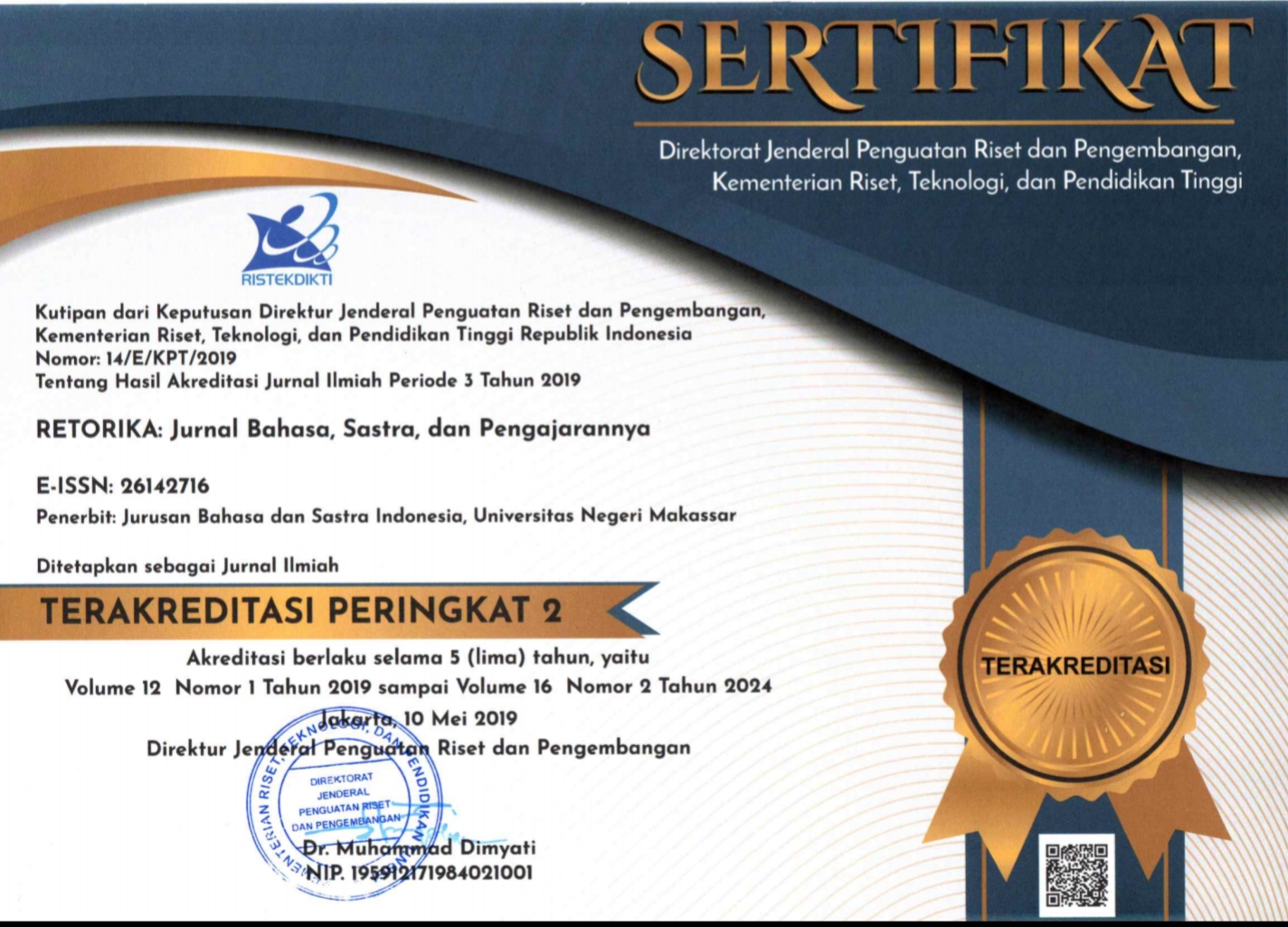STUDENTS-LECTURER(S’) SPEECH ACTS IN THE ACADEMIC PRACTICAL TEACHING SITUATED-COMMUNICATION
(1) Politeknik Indonusa Surakarta
(2)
(3)
(4)
(*) Corresponding Author
DOI: https://doi.org/10.26858/retorika.v13i1.11707
Abstract
Keywords
Full Text:
PDFReferences
Abhakorn, J. (2013). Classroom interaction and thinking skills development through Teacher-Talks. Kasetsart Journal - Social Sciences, 34(1), 116–125.
Agustina, S., & Cahyono, Yudi, B. (2016). Politeness and Power Relation in EFL Classroom Interactions : A Study on. International Journal of Language and Linguistics, 3(2), 92–100.
Al-Bantany, N. F. (2013). The Use of Commissive Speech Acts and Its Politeness Implication: A Case of Banten Gubernatorial Candidate Debate. Passage, 1(Vol 1, No 2 (2013): October Graduation 2013), 21–34. Retrieved from http://ejournal.upi.edu/index.php/psg/article/view/534
Arif, N., Muliati, A., & Patak, A. A. (2018). Male and female lecturers ’ politeness strategies in the EFL classroom. 1(2), 27–37. https://doi.org/10.33750/ijhi.v1i2.11
Austin, J. L. (1962). How To Do Things With Words. London and New York: Oxford University Press.
Basra, S. M., & Thoyyibah, L. (2017). a Speech Act Analysis of Teacher Talk in an Efl Classroom. International Journal of Education, 10(1), 73. https://doi.org/10.17509/ije.v10i1.6848
Culpeper, J. (2014). Geoffrey Leech, 1936- 2014 : The pragmatics legacy. 1–12.
Hikmah, I. (2017). Ketika Orang Jawa Meminta Maaf dengan Menggunakan Bahasa Inggris dari Perspektif Tindak Tutur. Parole - Journal of Linguistics and Education, 5(2), 106.
https://doi.org/10.14710/parole.v5i2.9590
IKEDA, S. (2014). Indirect Speech Acts. The Japanese Journal of Educational Psychology, 39(2), 228–238. https://doi.org/10.5926/jjep1953.39.2_228
Jiang, X. (2010). A Case Study of T eacher ’ s Politeness in EFL Class. 1(5), 651–655. https://doi.org/10.4304/jltr.1.5.651-655
Jucker, A. H. (2009). Speech act research between armchair, field and laboratory. The case of compliments. Journal of Pragmatics. https://doi.org/10.1016/j.pragma.2009.02.004
Kornielaieva, Y. (2019). Politeness Phenomenon. 32(1), 99–106.
Leech, G. (2014). Principles of Pragmatics. In Book Chapter (pp. 123–129). London: Longman.
Mahmud, M. (2019a). The use of politeness strategies in the classroom context by English university students. 8(3), 597–606. https://doi.org/10.17509/ijal.v8i3.15258
Mahmud, M. (2019b). the Use of Speech Acts in Angngaru of Makassar Society. RETORIKA: Jurnal Bahasa, Sastra, Dan Pengajarannya, 12(2), 141.
https://doi.org/10.26858/retorika.v12i2.9099
Matiki, A. J., & Kgolo, N. N. (2017). A Socio-pragmatic analysis of compliment responses among students at the University of Botswana. Journal of Humanities, 25(2), 62–89.
Nur, T., Zainal, A., & Mugableh, A. I. (2013). Speech Act of Promising among Jordanians. 3(13), 248–266.
Pujiastuti, R. T. (2013). Classroom Interaction: an Analysis of Teacher Talk and Student Talk in English for Young Learners (Eyl). Journal of English and Education, 1(1), 163–172.
Sadrina, Ramlee Mustapha, M. I. (2018). THE EVALUATION OF PROJECT-BASED LEARNING IN MALAYSIA : Propose a New Framework for Polytechnics System. 8(2), 143–150.
Searle, J. R. (1980). Speech Act Theory and Pragmatics.
Stadler, W. (2018). Teaching and Testing Sociopragmatics in the Russian Language Classroom. Athens Journal of Philology, 2(3), 149–162. https://doi.org/10.30958/ajp.2-3-1
Sumathipala, A. (2013). Qualitative research. Ceylon Medical Journal, 48(4), 136–139.
Susanti, R., & Rohmadi, M. (2019). Investigation of Students ’ Towards Environmental Awareness through Responses of Caring Speech Acts : A Case Study of Polytechnic’s Student in Surakarta , Indonesia. Wol2SED 2018. https://doi.org/10.4108/eai.21-12-2018.2282789
Susanti, R., Sumarlam, S., Djatmika, D., & Rohmadi, M. (2018). Responses to Caring Speech Acts: The Politeness Strategies of Indonesian Students in Academic Activities. Proceedings of the Fourth Prasasti International Seminar on Linguistics (Prasasti 2018). https://doi.org/10.2991/prasasti-18.2018.77
Thamrin, M. (2010). Ekspresi Tindak Direktif dalam Interaksi Kelas Bengkel Jurusan Teknik Mesin Politeknik Negeri Malang. LITERA, 9(1), 91–101.
Thuruvan, P., & Yunus, M. M. (2017). The speech act of request in the ESL classroom. 3L: Language, Linguistics, Literature, 23(4), 212–221. https://doi.org/10.17576/3L-2017-2304-16
Tri Budiasih, L. (2018). Illocution on Speech Acts of Foreign Students in Indonesian Learning. PAROLE: Journal of Linguistics and Education, 6(2), 41. https://doi.org/10.14710/parole.v6i2.41-48
Van Compernolle, R. A., Gomez-Laich, M. P., & Weber, A. (2016). Teaching L2 Spanish Sociopragmatics Through Concepts: A Classroom-Based Study. Modern Language Journal, 100(1), 341–361. https://doi.org/10.1111/modl.12318
Wafa & Indrawati Vahmita. (2017). Directive Illocutionary Act on English Teacher in Elementary School Sukoharjo 3 Probolinggo (Pragmatics Study). Metathesis, 1(1), 119–129.
Article Metrics
Abstract view : 773 times | PDF view : 123 timesRefbacks
- There are currently no refbacks.
Copyright (c) 2020 Ratna Susanti

This work is licensed under a Creative Commons Attribution-NonCommercial 4.0 International License.
Published by:
Department of Indonesian Language, Faculty of Languages and Literature, Universitas Negeri Makassar in cooperate with Asosiasi Dosen Bahasa dan Sastra Indonesia (ADOBSI) and Ikatan Program Studi Pendidikan Bahasa dan Sastra Indonesia (IKAPROBSI).
Address: Department of Indonesian Language Office, DG Building Second Floor, UNM Parangtambung, Daeng Tata Raya Street, Makassar, South Sulawesi, Indonesia
 Email: retorika@unm.ac.id
Email: retorika@unm.ac.id

RETORIKA: Jurnal Bahasa, Sastra,dan Pengajarannya is licensed under a Creative Commons Attribution-NonCommercial 4.0 International License.
















